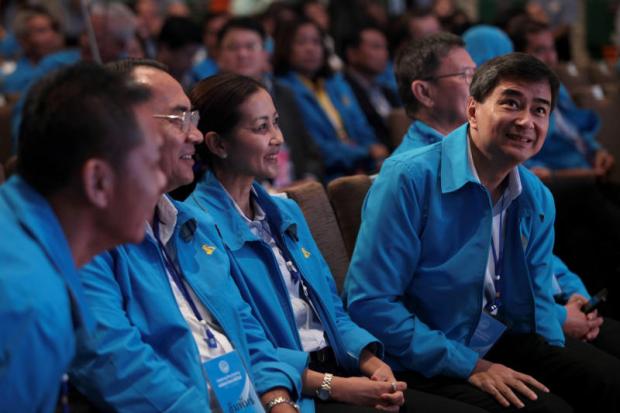
Former prime minister Abhisit Vejjajiva recently won re-election as the Democrat Party leader, seeing off two challengers. While the result concluded the question of who would lead the party into the next general election, tentatively scheduled for February 2019, it opens up many more unresolved issues about the party's electoral viability and future.
Thailand's oldest political party has found winning elections in modern times to be its biggest challenge, with the party last winning a plurality of the vote 26 years ago. Since decisively losing the 2001 election to Thaksin Shinawatra after losing popular support due to its management of the IMF's "bitter medicine" of austerity policies in the aftermath of the Asian financial crisis, the party has been unable to close the gap at the ballot box.
Under the leadership of Abhisit Vejjajiva, the Democrats boycotted the 2005 election, decisively lost in 2011 and boycotted another poll in 2014. His rise to the premiership came about only due to factional deal-making in 2008. Although the Democrats retain a substantial voter base, with strongholds in the wealthier southern and central regions, which are generally hostile to Thaksin, this has been insufficient to win a parliamentary majority and the Democrats have shown no sign of being able to appeal to a broader base.
The leadership election, therefore, represented an opportunity for change. This was the first time in which any Thai political party has ever permitted its general membership to vote directly for the party leader, making a step forward for political participation in Thailand.
Mr Abhisit's unimpressive track record in general elections left many wondering whether party members would finally opt for a new face. A particularly viable alternative seemed to be the fiery graft-busting former MP Warong Dechgitvigrom, who has promised to run on new platforms such as promoting a "welfare democracy".
Voters, however, opted to stick with the status quo, as Mr Abhisit claimed 52% of the 129,479 votes cast by Democrat members across the country. This may leave the the party in a weaker position, in many respects, than when it entered previous elections.
Firstly, Mr Abhisit remains radioactive to many red shirts who support Thaksin, due to his role in the military crackdown in 2010 on red shirts who were calling for a dissolution of parliament. Many red shirts blame him for losing friends or relatives during the crackdown, although a murder charge against him was dismissed in 2014.
This animosity towards Mr Abhisit makes it difficult for the Democrats to make any inroads into the electorally-rich north and northeastern regions that comprise Thaksin's stronghold, rendering the possibility of winning a parliamentary majority extremely remote.
Secondly, Mr Abhisit is no longer seen as a "new" or exciting face in Thai politics. During the campaign for party leader, Mr Abhisit in a video on his Facebook page attempted to address concerns that he is yesterday's news by admitting that while he is no longer a fresh face, he is still a leader that enjoys "learning new things".
His posters emphasised that he was a leader who delivers "political innovation". Indeed, one of his campaign hashtags, which roughly translates as "Build new things with Mark" (Mark being Mr Abhisit's nickname), demonstrated a forced attempt to try to retain the new shine on a party leader who has been in place for 13 years.
Compared to up and coming young leaders such as the progressive Future Forward Party's billionaire leader Thanathorn Juangroongruangkit, Abhisit will find running as "a new alternative" in the general election quite difficult.
However, it is still unclear what he platform will be able to run on. His opponents on the left have outdone him in terms of populism and progressivism, and with stronger claims to a commitment to liberal democracy. Running on his record as prime minister would bring the spotlight back on his polarising decisions during the 2010 military crackdown. Even more importantly, he cannot run to support incumbent Prime Minister Prayut Chan-o-cha's return as an "outsider prime minister", selected outside the usual parliamentary process.
Mr Abhisit has repeatedly denied he has any interest in collaborating with the new junta-aligned parties that are proliferating. Although many are ideologically similar to the Democrats, Mr Abhisit has refused to stand with them due to his stated commitment to democratic principles; this led a breakaway faction under popular protest leader Suthep Thaugsuban to form the new pro-junta Action Coalition for Thailand (ACT) Party.
Party members have endorsed Mr Abhisit's view. Alongkorn Ponlaboot, a fellow candidate in the leadership race who served in a number of roles within the military government and is seen as more receptive of the junta, won only 0.17% of the vote. But the party's refusal to join a coalition with Thaksin-aligned or junta-aligned parties could see the Democrats once more left as the opposition.
While Mr Abhisit's re-election means a seasoned ex-premier is returning to lead Thailand's oldest party, it is also likely to present to them the same issues at the ballot box that it has struggled with in the past.
To overcome this, the party will need to find new ways to appeal to voters in the poorer North and northeastern regions, shed its technocratic and elitist image, and retain as much of its base as it can without losing too many to pro-junta parties.
Whether it can do all that remains to be seen.
Ken Lohatepanont is studying political science at the University of California, Berkeley.